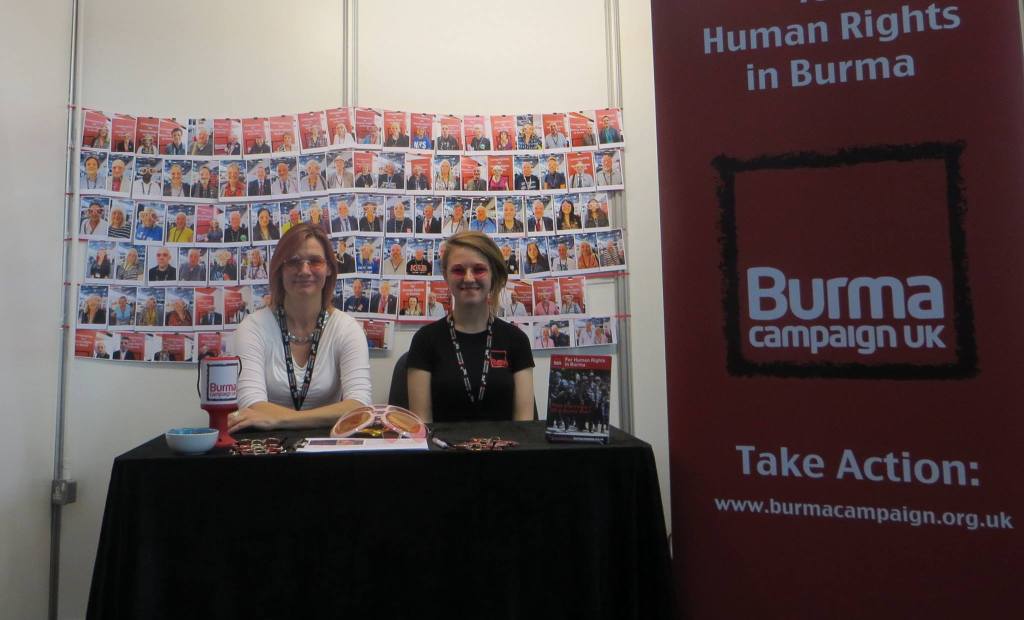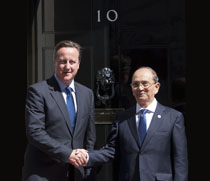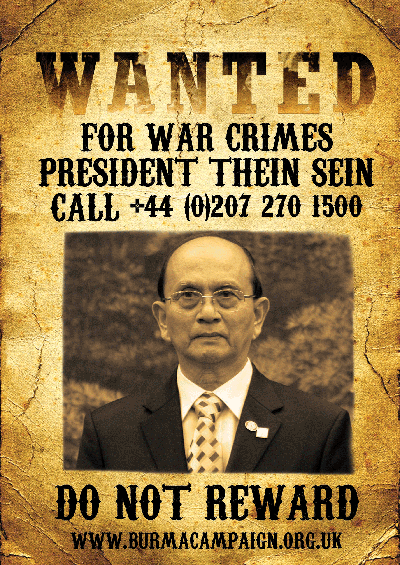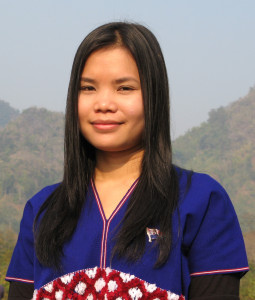Economic Reforms ‘Given Greater Priority’ Than Political Freedom
Article in the Irrawaddy quotes Burma Campaign UK:
Economic reform has taken preference over political reform in Burma, said an international human rights group campaigning for the release of what it terms political prisoners still jailed in the country.
The Burma Campaign UK is urging Britain’s foreign secretary to pressure the Naypyidaw government as part of its No Political Prisoner Left Behind campaign.
“Economic reform has been given greater priority than political reforms by the Burmese government, yet still Burma is being ranked as one of the most difficult countries in the world to do business in,” campaign director Mark Farmaner told The Irrawaddy.
He was referring to a recent World Bank global study that ranked Burma as one of the worst places to do business because of numerous bureaucratic and legal obstacles. For example, a company wishing to build a warehouse has to go through 16 application processes which on average takes 159 days.
“The real beneficiaries of economic reforms in Burma are the same business cronies who were dominating the economy before the reforms began. The business cronies have key sectors of the economy stitched up, making it hard for foreign businesses or small and medium size Burmese businesses to compete,” said Farmaner.
Burma Campaign UK is petitioning the British government to pressure Naypyidaw to free Htin Kyaw, a leader of the Movement for Democracy Current Force that campaigns against land grabbing. He was arrested in May for protesting without permission and distributing leaflets that criticized the government, said Farmaner. Htin Kyaw is now serving a nine-year sentence in Insein prison.
On the Frontline: Poverty, Opium and Militarisation in Modern Burma’s Golden Triangle
An article by Burma Campaign UK’s Researcher Alec Scott.
‘In the past 8 years opium production in Burma has nearly tripled. Ninety-seven percent of Southeast Asia’s opium is produced in Burma, with 92% of production located in Shan State in the east of the country. Shan State is mountainous and home to many ethnic peoples, such as the Ta’ang whose villages and pagodas cover the hilltops of the state’s northern townships. This tortuous landscape of tea plantations and paddy farms has become one of the epicenters of the region’s bourgeoning heroin and methamphetamine trade.
In the poor and largely inaccessible villages of northern Shan State’s Namkham Township up to 80% of young Ta’ang men are addicted to drugs, namely heroin and an Amphetamine Type Stimulant (ATS) known as Yabba. “In our Ta’ang area drugs can be found and bought everywhere and many people are becoming addicts. Because of this the education and healthcare situation is getting very low in Ta’ang communities”, explained U Ban Di Sa, the Buddhist monk and founder of the Ta’ang Monk’s Union. U Ban Di Sa accused the central government of being complicit in the drugs trade, saying that “The central government has used drugs as a political tool to maintain their power.”’
Burma’s President Thein Sein in the Hague At Last
Article in the Huffington Post by Mark Farmaner, Director at Burma Campaign UK.
“This week Thein Sein, President of Burma, will be visiting The Hague, in the Netherlands. As a man with a lot of blood on his hands, you might be thinking this is long overdue. But instead of being indicted at the International Criminal Court (ICC) for his involvement in war crimes and crimes against humanity, Thein Sein will be receiving red carpet treatment from the Dutch government.
In a few short years, the Netherlands has gone from a country that strongly supported human rights in Burma, to a country prepared to ignore the multiple violations of international law since Thein Sein became President in 2011, and the numerous violations of international law that took place during the 14 years that he was on the ruling council of the previous military dictatorship.”
At the TUC in Liverpool
Anna Roberts and Emily Butler at the TUC in Liverpool with our photo wall of new supporters for Burma Campaign UK’s Rose-Tinted Glasses campaign!

Ice Bucket Challenge for Burma Campaign UK!
Supporter Isobel Thompson completed the Ice Bucket Challenge for Burma Campaign UK on her 19th birthday – thanks Isobel!
‘The British government is promoting its own interests in Burma’
Zoya Phan, Campaigns Manager at Burma Campaign UK, is featured in the New Internationalist magazine.
‘The government policy on Burma is soft,’ says Zoya Phan with a hint of anger in her voice. ‘They are promoting their own trade and business interests. I want to see a more robust policy from [British Prime Minister] David Cameron that challenges the government in Burma and tackles their impunity.’
A member of Burma’s Karen ethnic minority, Zoya was named after Zoya Kosmodemyanskaya, a Russian partisan who died fighting against the Nazis at the age of 18. Unlike her namesake, Zoya, now 33 and living in England, managed to escape the clutches of a despotic invasion and has become the global voice for the Karen community. While she was able to escape a cycle of suffering, hundreds of thousands of her people are still trapped and at the mercy of the military junta.
Hugo Swire, Ethnic Cleansing of Rohingya Isn’t a ‘Bump in the Road’
Article in Huffington Post by Mark Farmaner, Director of Burma Campaign UK.
Four years after its reform process began, Burma still has one of the worst human rights records in the world. In fact, human rights violations which break international law have actually increased, with evidence of war crimes, crimes against humanity, ethnic cleansing and even precursors of genocide all happening under President Thein Sein’s rule.
These violations don’t fit easily into the ‘transition to democracy’ narrative which the British government is trying to present about Burma.
So when Foreign office Minister Hugo Swire MP is confronted with the inconsistency of claims of reform, and ongoing human rights violations on the ground, he faces a problem. The solution British diplomats, and diplomats in the USA and the rest of Europe seem to have agreed upon, is to dismiss these abuses as ‘bumps in the road’. ‘No transition is going to be easy’, they say. ‘Of course there will be occasional setbacks’, they say. ‘Just being cynical isn’t going to change anything’, they say. ‘The overall direction of travel is good’, they say.
This last phrase is perhaps the most telling. What they are effectively saying is that as long as government-led reforms continue, they won’t allow what is happening to the Rohingya to influence their policy of building closer relations with the Burmese government. Think about how the Burmese government will interpret this messaging. It is literally handing them a get out of jail free card to do what they like regarding the Rohingya. And as we have seen since 2012, they are playing that card at every opportunity.
UN Special Rapporteur on human rights in Burma assess the current situation in Burma
Is Thein Sein the world’s least scrutinised Head of State?
In assessing the reform process in Burma, which is an entirely top-down process, examining the man leading the reforms is essential.
Article in The Irrawaddy by Mark Farmaner, Director of Burma Campaign UK.

UN Rights Body Says Govt Detention of Kachin Farmer Illegal
Article in The Irrawaddy:
The United Nations Working Group on Arbitrary Detention has ruled on the case of ethnic Kachin farmer Brawn Yung, who is serving a 21-year sentence in Myitkyina Prison, and called on the Burmese government to immediately release him and offer reparations because his detention is illegal.
Wai Hnin Pwint Thon, campaigns officer at Burma Campaign UK, said in a statement, “By keeping Brang Yung in jail it is President Thein Sein who is the one breaking the law, not Brang Yung.
“The failure to release political prisoners, even when the UN rules their detention is illegal, is yet another example of the backsliding of the reform process.” The campaign group is calling for a new independent review mechanism for political prisoners to be established in Burma.
You can take action to free Brang Yung here.




